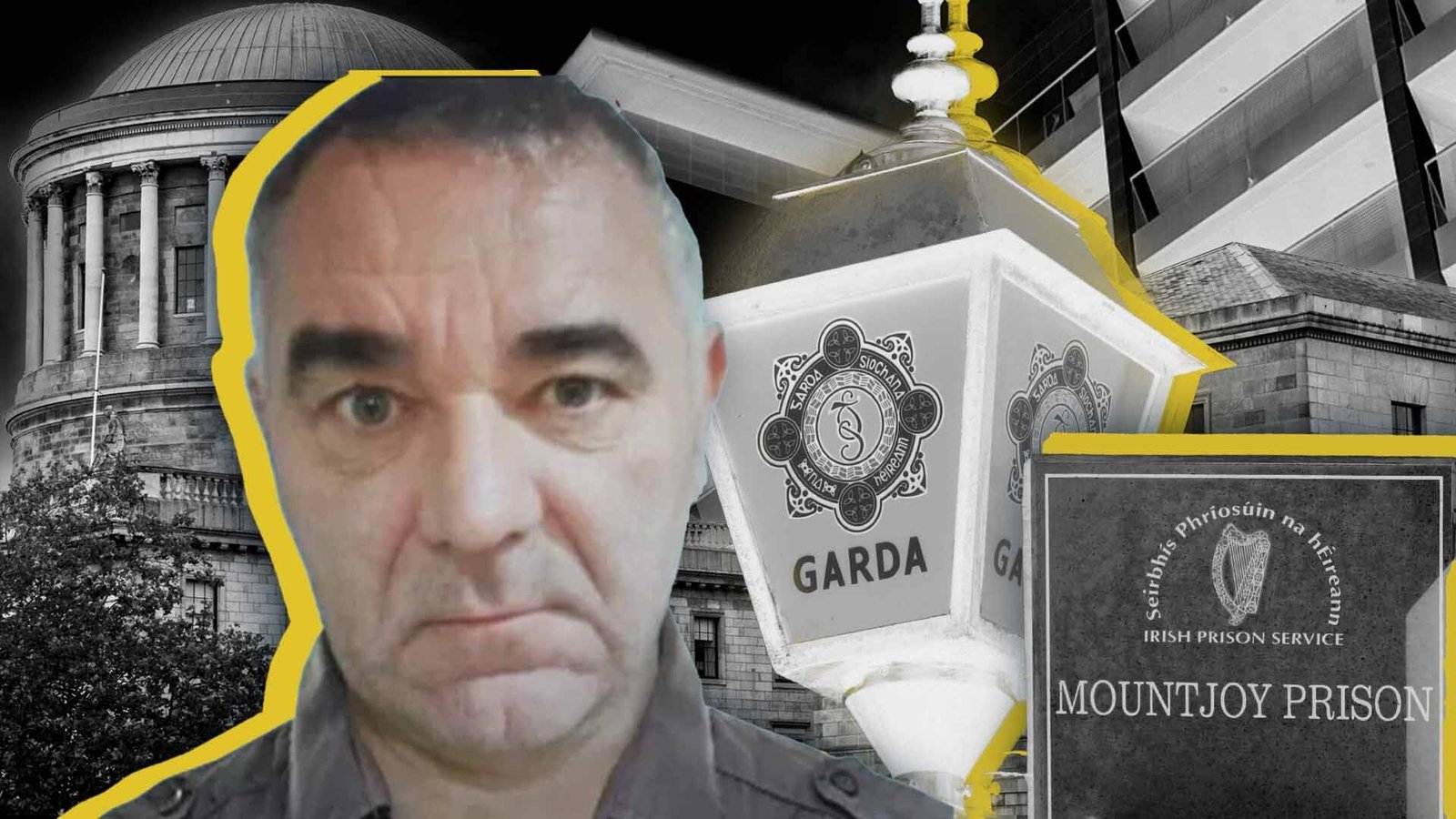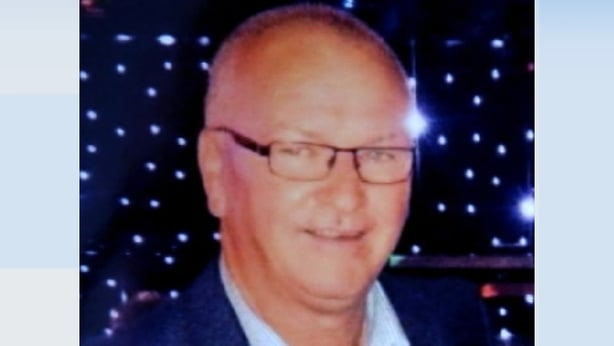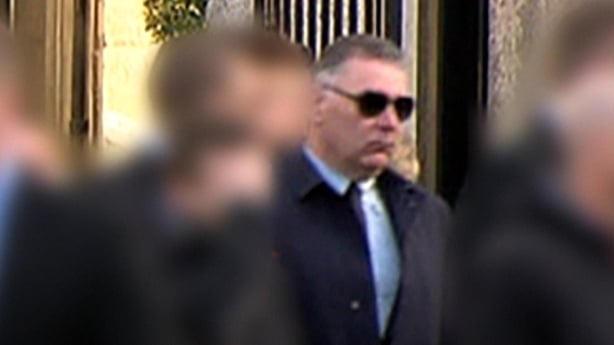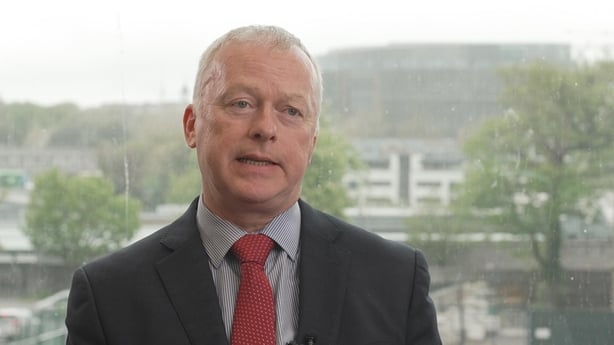World
‘Mr Nobody’: How a trucker turned Kinahan gang leader was caught

Convicted criminal Declan Brady was sentenced to ten years in prison on Monday for his involvement in the 2016 murder of 62-year-old Noel Kirwan.
A senior criminal figure who is also known by his nickname ‘Mr Nobody’, Brady now stands convicted of three serious and distinct criminal offences committed by the Kinahan Organised Crime Group.
Noel Kirwan, who gardaí say was not involved in criminality in anyway, was shot six times in the driveway of his home. He had been photographed with Gerard Hutch at the funeral of Eddie Hutch, who was shot dead as part of the Hutch-Kinahan feud.
Gardaí believe Mr Kirwan was targeted because of the false assumption that he was involved in the Hutch Organised Crime Group.
Brady is the third member of the Kinahan crime group to be convicted in relation to the murder. He is already serving sentences for money laundering and firearms offences, but claims he is no longer affiliated with the Kinahan group.
Mr Justice Martin Nolan suspended the final year of Brady’s sentence on condition that he continues the process of disassociation from the gang.
But what do we know about the crime figure nicknamed ‘Mr Nobody’ who only got involved in criminality in his 40s?
For the first 44 years of his life, it seems Declan Brady kept his head down.
Born in 1966 at the Coombe Hospital in Dublin 8, Brady grew up in Walkinstown in south Dublin. He left school at age 14 and worked with his father who was a haulier. Eventually Declan Brady became the head of his own trucking company, involved in international haulage.
Married and with children, Brady and his family moved to a five-bedroomed detached home in Celbridge, Co Kildare.
It wasn’t until 2010 that Declan Brady surfaced negatively on the radar of officialdom, but it wasn’t for criminality.
Stubbs Gazette records show that on 12 July 2010 Brady’s firm – Brady Transport – had a judgment registered against it for unpaid tolls. Declan Brady was left with a bill of €5,621.56.
Things went from bad to worse the following year when on 22 August 2011 Brady was given a tax bill of €57,942.12 by the Collector General for unpaid tax.
Brady’s financial woes in 2010 and 2011 may give some indication of financial pressures he was under. Yet it doesn’t answer the question of how he rose over the coming years to be the Kinahan gang’s trusted logistics man in Ireland, or when he actually began to associate with the cartel.
What we do know is that some point he became good friends with Thomas ‘Bomber’ Kavanagh, a Kinahan cartel associate who is now serving a 21-year sentence in England for drug smuggling.
Kavanagh is originally from Drimnagh in Dublin’s south city, not too far from Brady’s original home at Walkinstown Parade. Brady is slightly older than Kavanagh, who racked up his first criminal conviction as a teenager. The fact the two men were very close in more recent years begs the question as to how and when their criminal friendship blossomed.
Certainly, at some point the paths of Kavanagh and Declan Brady crossed, and Brady eventually became a trusted lieutenant in the Kinahan crime cartel.
The decade between 2010 and 2020 was a big one for Brady on the crime front.
He now stands convicted of three distinct crimes – money laundering over a number of years, possession of firearms found at a cartel logistics depot, while his most recent guilty plea was for his role in providing support to the Kinahan gang in their murder of Noel ‘Duck Egg’ Kirwan.
Noel Kirwan was a prominent anti-drugs activist in the 1980s and 90s in Dublin’s inner-city. Former Labour Party TD for Dublin Central Joe Costello remembers Noel Kirwan from that time.
“I knew Noely well. He was one of the people who was continually on marches, participating, protesting about the issue. The inner city was awash with drugs at that time, right throughout the eighties and the nineties,” Mr Costello told Prime Time.
“There was very little response from the authorities and the Department of Justice. Nothing was being done. Basically, the community was left to own devices,” the former TD added.
Noel Kirwan would become a gangland murder victim in December 2016.
The 62-year-old father and grandfather was not a criminal. From garda investigations, it seems he was murdered for attending the funeral of his childhood friend Eddie Hutch, who was shot dead by the Kinahan gang in February 2016.
Noel Kirwan had grown up in the same tenements in north Dublin as Eddie Hutch and his siblings. Kirwan was photographed at the funeral beside Eddie Hutch’s brother Gerard, also known as ‘The Monk.’
Role in murder
In October 2016, a Kinahan gang member bought a tracking device in a shop in Leeds, England.
He brought it back to Ireland via the ferry at Holyhead. The tracker was stored in a number of locations in Dublin before it was secretly affixed to the car of Noel Kirwan. The tracker was first placed on Noel Kirwan’s BMW.
When he traded in that car for another in December 2016 members of the Kinahan gang retrieved the tracker and placed it on Kirwan’s new car, a Ford Mondeo.
It would be used to trace Kirwan’s movement from an apartment in Sandyford in the run-up to his killing.
At his sentence hearing for his part in assisting the Kinahan crime gang murder Noel Kirwan, it was stated that Brady got involved in crime for financial reasons, and once he was involved, he couldn’t find a way out.

“Declan Brady was one of the critical enablers and facilitators for the Kinahan organised crime gang. His role was very extensive within the organisation. His expertise in logistics and transport, was critical for the criminal organisation,” Séamus Boland, Detective Chief Superintendent with the Garda Drugs and Organised Crime Bureau, said.
READ: Man jailed for nine years for role in Noel Kirwan murder
At the height of his criminality Brady had substantial wealth. As well as having homes in Firhouse in south Dublin and in Celbridge, he also had properties in the Spanish resort of Marbella and Tavira in Portugal.
By now he wasn’t exactly keeping the head down, but he was still an unknown quantity to many in law enforcement.
He was laundering hundreds of thousands of Euros on behalf of the Kinahan cartel. He was known to splash the cash and the Special Criminal Court previously heard how a bill for a wedding in 2015 came to over €66,000 – including a bar tab which was paid with €27,000 cash.
Brady got both his wife and later his partner involved in laundering cash, and both women later pleaded guilty in court and received suspended sentences. Brady’s wife eventually got a one-year custodial sentence when the Director of Public Prosecutions appealed the leniency of the original sentence.
It was the funeral of David Byrne where Brady first came to significant garda attention. Byrne had been shot dead in an attack by the Hutch Organised Crime Gang at the Regency Hotel in February 2016. Detectives already knew Brady was an associate of people linked to the Kinahan group, but his seniority was not known.
Brady was wearing a similar shirt and tie to a number of other mourners, including his friend Thomas Kavanagh, who was Byrne’s brother-in-law.
Soon after the funeral of David Byrne, Brady gained the nickname ‘Mr Nobody’, based on his previous anonymity, a life in the shadows which would soon fade away.
Less than 12 months after attending Byrne’s funeral, Brady was caught red handed, linked to fifteen firearms found in a Kinahan gun depot at the Greenogue Industrial Estate in west Dublin. The guns, some of them loaded and ready for use, were found in what was supposedly a legitimate business premises.

When armed gardaí raided the premises in January 2017, they first saw a sparse downstairs, with general office materials on a desk. It was only when they went upstairs that they found the weaponry.
The haul included nine revolvers, four semi-automatic pistols, a submachine gun and an assault rifle. Over 4,000 rounds of ammunition were also seized.
It was a massive blow to the Kinahan gang, but the seizure also laid bare Brady’s senior position within the Kinahan structure. While the Special Criminal Court would later hear that Brady took orders from people outside of Ireland, he was a significant cog in the criminal wheel within Ireland.
But it has only been his most recent guilty plea – to facilitating the Kinahan gang in the murder of Noel Kirwan – that the extent of Brady’s crimes have come to be exposed.
Noel Kirwan was shot six times as he sat in his car in Ronanstown on 22 December 2016.
For more than two months – from late October 2016 – a plot had been afoot to target Noel Kirwan. A rented apartment at the Beacon South Quarter in Sandyford was used by the Kinahan gang to monitor a laptop which in turn was remotely monitoring the tracking device which had been placed on Kirwan’s car.
Brady was one of those linked to the apartment. A toothbrush with his DNA on it later helped prove his association to the premises, and CCTV footage also showed his movements.
Having pleaded guilty to money laundering charges and gun charges, Brady began serving his sentence in Mountjoy Jail, and was later moved to the Progression Unit where prisoners with ‘enhanced status’ serve their sentences. It was from that part of the prison that Brady was taken in 2022 to be charged by gardaí investigating the murder of Noel Kirwan.
Just like his previous convictions, Brady eventually pleaded guilty to the allegation that he had provided assistance to the Kinahan gang which committed the murder of Noel Kirwan.
In a plea for leniency, Brady’s barrister Michael O’Higgins stressed his client had now disassociated himself from a criminal group. Mr O’Higgins said Brady has broken all connections with criminals and has demonstrated he is on “a path to change.”
The court was told that when Brady is eventually released from prison, he has a work offer from a relative in a building firm.
Noel Kirwan’s daughter Donna has in recent years provided four victim impact statements to the Special Criminal Court, which has now sentenced four men for their roles in the murder of Noel Kirwan.
In her statement at the sentence hearing for Declan Brady, Donna asked him what he gained and was it worth it.
“You hadn’t the intelligence to do your homework”, she told him. “Dad was an innocent man. How does it feel to know you’re going to prison for killing an innocent man?” Ms Kirwan said.
As gardaí continue to pursue other suspects in the murder of Noel Kirwan, detectives are focused on senior cartel figures who have long left Irish shores.
Officers are also aware that there may be other ‘Declan Bradys’ out there – people with no previous criminal convictions who somehow find themselves involved at a very senior level of organised crime.
“Firearms aren’t manufactured in Ireland, and controlled drugs like cocaine or heroin aren’t manufactured in Ireland,” Det Chief Supt Boland said during the trial.
“So having unknown people who have good experience or involvement in logistics are the people who will be targeted by organised crime gangs,” he added.
With Brady now unmasked as a significant figure who was involved in many aspects of the Kinahan cartel, garda investigations continue to identify others who somehow became involved – people whose names might not be widely known, but who are very senior figures in organised crime.
“If there’s one thing that has been learned by law enforcement from the events of 2015 and the events of 2016 as well, it is important to identify, who are the enablers, who are the facilitators, who are the benefactors, and who are the decision makers of all of these groups. And they must be pursued,” Det Chief Supt Boland said.

Reporter Barry Cummins and producer Sallyanne Godson’s report on the crimes of Declan Brady will be broadcast on the 25 June edition of Prime Time on RTÉ One and the RTÉ Player.










